European City Bikes and the North American Market
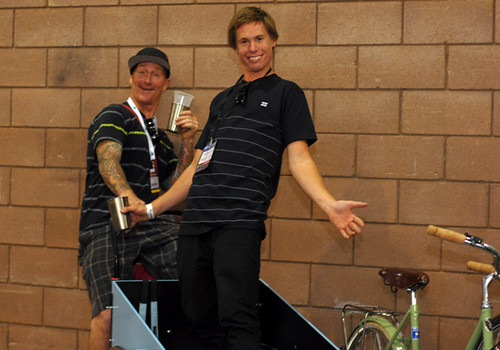 |
| BMX Bad Boys can't resist cargo bike |
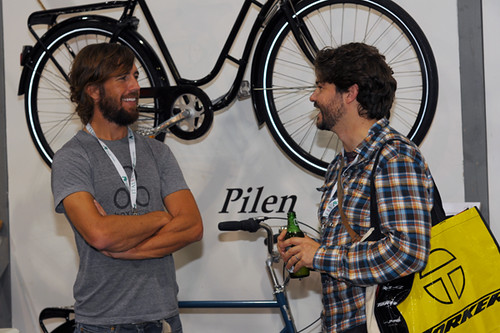 |
| Will of BoxCycles and Josh of Portland Velocipede |
Typically, a European manufacturer will sell bicycles in N. America through a distributor. The distributor imports the bicycles in batches at wholesale prices, then sells them to bicycle shops throughout the region. Some distributors specialise in a single manufacturer, while others represent a variety of brands. Distributors exist, because it is often not possible for individual bike shops to commit to large enough orders from the manufacturer directly to justify the shipping and import costs. It is also quite time consuming to form relationships, negotiate prices, and navigate currency exchange rate changes with manufacturers in the EU, and bike shops tend to have their hands full with a million other things. So the distributor takes care of this and enables bike shops to place small orders. Where it gets a little more complicated, is that some entities are both bike shops and distributors, but the above describes the gist of it in the majority of cases.
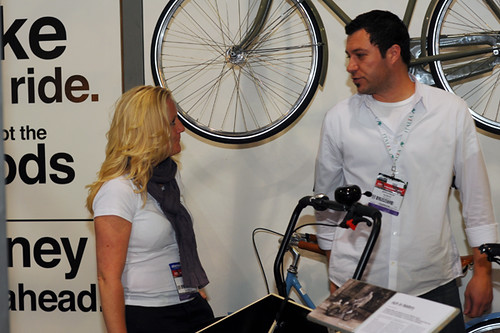 |
| Sussi of Biomega with Boston-based Distributor |
Possibly, especially if it's a small manufacturer. But to buy a single bike in this manner is painfully expensive. Manufacturers are typically committed to using specific shipping methods (which include the services of a broker), and it can cost as much as $400 once you are done paying customs and broker fees to deliver the bicycle to an American address - and this will be on top of the retail price they will charge you, since you will not be buying wholesale. If the bicycle you want is not sold in North America, you are better off finding a retailer abroad who sells it and buying it from them, as they are more likely to use standard international shipping methods.
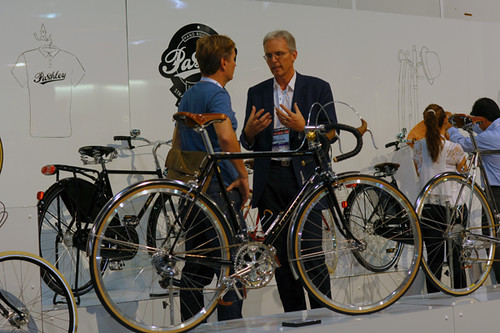 |
| Adrian of Pashley Cycles and Chris of AdventureCORPS |
If a bicycle is not sold in your local bike shops but there is a North American distributor for it, they will usually be willing to sell it to you directly - albeit at retail prices. This means that it will cost you the same to buy the bike from the distributor as it would to buy it from a bike shop in another part of the country - so it really becomes a matter of shipping costs. If the distributor is closer to you, then it's a good idea to go through them as shipping will be cheaper. Otherwise, it makes more sense to find the nearest bike shop that carries this bicycle and order from them.
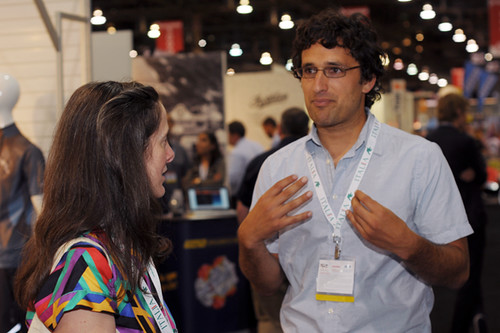 |
| Julie of Adeline Adeline and Josef of Flying Pigeon LA |
Importing European city bikes is costly, because it is still a specialty item in North America and even at the distributor level the orders are not huge. The orders are not huge also because many of the manufacturers are small and can only produce so much volume at a time. So all these costs of import tax, currency conversions, shipping, broker fees, dealer markups, etc., get divided over a relatively small number of bikes, which reflects in the retail prices.
Do bike shops make large profits on bicycle sales?
I am not sure whether I am "allowed" to reveal actual numbers, but the markup for the bicycles themselves is eyebrow-raisingly small. Most of the money is made on accessories and components, where the markup is considerably higher. This is counterintuitive for most shoppers and I myself was surprised to learn it, but that's indeed how it is. It is particularly true for bikes that are handmade in the EU, which are costlier to produce and leave little room for markups without the retail price becoming ridiculous.
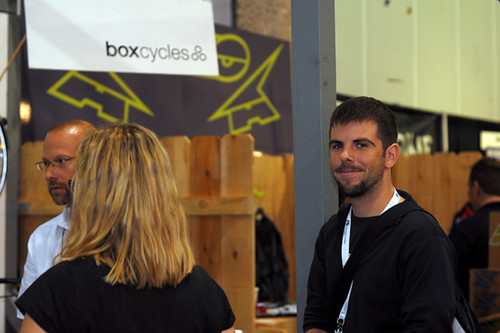 |
| Jordan of Bicycle Space DC |
Try talking to them about it. Seriously, give it a try and tell your friends to do so as well. Look up the distributor for the manufacturer whose bike you'd like to try, and give the bike shop owner their contact information. Especially if it's a small bike shop and if the distributor's terms are favourable (small minimal order, etc.), they might be willing to give it a go if customers seem interested. The distributor may even be willing to bring over a floor model to the bike shop and leave it there for a few days to see how customers react. It all depends on the human factor - i.e. the attitudes of the distributor and the bike shop owner, and the enthusiastic persuasiveness of the customer. If there is evidence of local demand, few bike shops will ignore it.
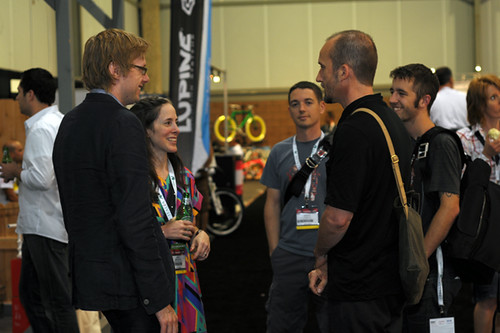 |
| The staff of CleverCycles and AdelineAdeline |
Though in 2008-2009 some worried that the budding interest in European city bikes could be a passing fad, demand has been rising steadily - as is evident by the increasing number of specialty shops popping up across North America. Mind you, it hasn't been perfect. Some distributors have gone out of business and new ones have sprung up. Some manufacturers have become infamous for quality control issues and bike shop employees roll their eyes when those brands are mentioned. Some customers who purchased bikes in the early days were ultimately unhappy with the weight or limited gearing, and a second-hand market has emerged. But over time more options have become available - from heavy-duty to lighter weight bicycles - and both customers and dealers have grown more informed about the nuances of the different types of bikes. There is more of an effort to match up the right owner with the right bike, as opposed to a "Dutch bikes for everyone/ heavy is good!" sort of attitude. Models with hill-friendly gearing options and more varied colour schemes have appeared due to popular demand as well. Some bike shops even get special editions of bicycles made to suit their customer base - such as the Pilen Portlandia, made especially for CleverCycles.
Small world, reciprocal influence
In general, the world of classic European city bicycles is quite small - a virtual village, as it were - and this allows for a great deal of feedback and even influence on the part of customers and bike shops. Shortly after I bemoaned Gazelle's fall to the unicrown fork, I was informed by Josh Boisclair of My Dutch Bike that Gazelle will be switching back to the cast crown fork as a result of North American dealer pressure. Seriously? That's great news, and more than a little funny. The Americans want their Dutch bikes traditional! Fascinating that there is enough of a market here now for customers' and dealers' voices to matter.
See more of the faces behind your favourite bike shops and brands here and here!

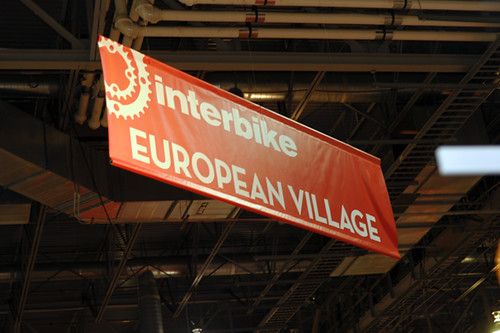
Great post, as usual! BTW, Flying Pigeon LA is my LBS and unless he has a twin I don't know about, the guy in your photo is the awesome Josef. (Although, admittedly, I've never before seen him sans t-shirt and knickers.)
ReplyDeleteSorry about that - though I could have sworn that Josef signs his emails as Umberto! Maybe I need sleep.
ReplyDeleteJust wanted to make a comment to say that "My Dutch Bike" is an awesome store, and their employees are really nice! My favorite bike store in San Francisco! They import not only bicycles, but many really neat hard-to-find accessories too.
ReplyDeleteEh, AFAIK, the Gazelle Toer populair with a nexus 8 has been issued with the US market in mind too. It's referenced as a "USA T8" and is not shown on the dutch website.
ReplyDeleteI found this article very interesting. Thanks. :-D
ReplyDeleteready-made options of the same caliper. I prefer cantis :).
ReplyDeleteI'll confirm based on what I've been told that bike shops make little to no money on new bike sales. Every bike shop owner I've ever talked to has told me their profit comes from repairs and parts and accessory sales. Even there the margins aren't great compared to other businesses. Nobody sane opens a bike shop because they are looking to get rich.
ReplyDeleteThe upshot of this is any decent bike shop is going to be looking for a long-term relationship with their customers.
If you have a good relationship with a local bike shop do try to give them first shot at your business when buying a new frame or bicycle. If it is a brand they don't normally carry they might be able to get a floor model in for you as Velouria said. If not it still is often less hassle for you to have them order it through the distributor than for you to order directly.
Furthermore for the same retail price on a complete bike a local bike shop will typically throw in fitting services, assembly, and a 200 mile tune-up.
Regarding profit margins, mark-ups etc.
ReplyDelete"How do you make a million dollars in the bike industry, start with two million"
Those of us working in the bike trade have no expectations that we're going to get rich !
That's definitely Josef of Flying Pigeon! Or at least his dress-shirt-clad doppelganger.
ReplyDeleteFP is awesome.
Gina
I don't think there's any big secret about typical markups on bikes. It varies by brand and region, but it's often below 30%, before you factor in shipping costs, which have been climbing pretty rapidly in the last few years, and the cost of assembly. This means on entry-level bikes the shop might be barely breaking even (which might help bike shoppers understand the reaction they get from their LBS when they ask "but what can you do for me on the price?" ;-) ).
ReplyDeleteFrom the bike shop perspective, low minimum orders are a key in getting small shops to try out new (to them) types of bike. They type of bike that sells in a particular shop varies a lot by clientele and region and owners are nervous about laying out money for something that might now sell.
What I'd really like to see is a European city bike company cut a deal with an American distributor like QBP (who wholesale Surly, Civia and Salsa bikes, as well as parts, clothing and accessories) so that shops could even order them on a one-by-one basis. That might suit shops like the one I work at, where there's not much market for City bikes (suburban/semi-rural sprawl with many hills and 55mph arterial roads throughout), but an occasional customer could get one, and we might keep one in the shop to show off.
Good post! :) I bothered about with this issue while deciding on the Gazelle. Even though I decided ultimately NOT to purchase it, the experience was valuable anyhow!
ReplyDeleteNB: The editor in me wishes to point out that in your first paragraph of the post, the word "caliper" should be changed to "caliber" although perhaps for purposes this blog a caliper might be more relevant than a caliber. ;)
Thanks for the additional photos. It is nice to put faces to familiar names, even tho' we mostly want to see bikes. It is especially good to hear that Gazelle is listening re: proper fork crowns. Not important, but in the opening sentence the usual phrase is "of the same caliber" rather than "caliper", but then you are talking about bicycles, eh? ;-) Great post!
ReplyDeleteCan I ask who has had QC issues? I'm not aware of any specific European companies with them, and I generally assumed most of them had higher QC than domestic bicycle companies.
ReplyDeleteYes caliber, not caliper - thanks : )
ReplyDeleteI was really inspired by all your posts on your Bella Ciao bicycle. It makes me want to test ride one as I'm looking for a new & better city bike! Do you know when they may go out to stores?
ReplyDeletethx!
I think they may already be in a couple of stores - you may want to email BoxCycles to ask.
ReplyDeleteI know Clever Cycles also orders directly from WorkCycles in the Netherlands, and WorkCycles packs up a shipping container for them every so often and sends it over. This means there is some room for custom orders as well (if you, for instance, want a 3-speed coaster brake instead of the 8-speed hand brake they typically order), for the same shipping price, you just have to wait for it to be built and sent with the next container.
ReplyDeleteBut yeah, due largely to shipping costs, the WorkCycles bikes cost about $500 more here than in the Netherlands (plus people in the Netherlands get large tax breaks and employee incentives to buy bikes) :)
Anon 10:56 - I am reluctant to badmouth a manufacturer without either having personally experienced the thing I criticise them for, or having a quote from a professional who is willing to be identified. Otherwise it's hearsay/rumor and I feel it's wrong to affect a manufacturer's reputation that way. But there were several European manufacturers whose QC was criticised by bike shop owners at Interbike.
ReplyDeleteAnon 1:39a
ReplyDeleteThat is indeed Josef from Flying Pigeon LA. He is my 'no so local' bike shop. In fact my beloved Gazelle is at his store right now for repairs.
If any readers are in the LA area, then head over to FP. you won't be disappointed.
Some European city bike manufacturers are willing to sell directly to American end users--Van Nicholas comes to mind. Lately, the Europeans have learned that subsidized shipping to the States can make sense--as I recall, Van Nicholas ships bikes to the U.S. for about US$ 80.
ReplyDeleteI think it's worth mentioning that a handful of American distributors of higher end city bike components, including Roholff, Tubus, Son and Schwalbe, charge truly extraordinary markups in the U.S. market. It's possible to buy these items at www.starbike.com (a German online retailer) at about half normal American prices, even including the shipping charges.
V - thanks for not offering criticism of brands that you haven't had experience with. That's a classy as well as the correct approach.
ReplyDeleteNo matter which company you are dealing with there is always the potential for a problem. With the majority of bikes "sourced" from far- away factories issues may not even become apparent until a shop receives the bike and opens the carton.
How quickly and how well the vendor responds and reacts to take care of the issue is often times the determining factor in whether a shop will continue to offer that brand.
These kind of situations can arise with even the biggest bike companies as well.
The smaller shops will be much more tolerant of "offenses" than the bigger shops. In many cases the small brands can handle the problem more efficiently and effectively because they are not corporate and can turn on a dime.
I had to look up Van Nicholas. A Dutch titanium bike company! They look pretty nice actually. But this is not the industry I am talking about here. For one thing, their bikes probably weigh 1/5th of what a city bike weighs.
ReplyDeleteWow! Insight on everything from seatclusters to an overall summation of the city bike industry - your Interbike coverage has had tremendous scope. thanks, City Bikes
ReplyDeleteMatt - no sure QPB, though I'd like to see it as well, is willing to invite competition to their house brands.
ReplyDeleteLot of good industry anon comments today. Thanks for the tip anon 12:07!
I used to see some Van Nichols floating around on the roads here, no more.
Interestingly, but not surprisingly, the Left Coast, aside from PDX, is a dead zone for Euro city bikes. No doubt due to increased shipping costs vs. the East Coast, riding culture and cowboy spirit.
There are, of course, stand alone guys like CoreyK...
Maggie -- Is yours the "Nottingham" Gazelle? Made by Raleigh? Double top tubes? If so, kudos to you on your gorgeous restoration! I've never seen one like it.
ReplyDeleteV -- This post has really answered a lot of questions for me. But it also illustrates my biggest frustration -- lack of product in stores. Even in the biggest cities, I don't know of a single shop where I can walk in off the street and test ride a Gazelle, a Pilen, a Bella Ciao, a Pashley, a Rivendell, etc. side by side. What's on the floor seems to depend on when the elusive shipping container full of bikes hits our shores. And heaven forbid you DON'T happen to live in a big city or cycling mecca. You could live your whole life without ever seeing a fully-lugged transportation bike.
As I type this, I'm ready to purchase a new bike. I really, really, really want to put my hands on both the Bella Ciao and the Pilen before pulling the trigger. But what are my options? Fly to Portland? Fly to Massachusetts? (I actually almost flew to Vegas for Interbike and am now kicking myself that I didn't.) I don't know what the answer is, but I do wish the supply chain was more reliable and that ALL of these lovely bikes were available to the public en masse.
Velouria,
ReplyDeleteI'm Anon 10:56, and no worries. I understand. As someone who really places a high value on quality, it's always a concern for me.
Michael - Also, to clarify, the QC issues are often not seen by the customer, because they are taken care of by the bike shop during assembly. For instance: The Brand X shipment will arrive, and 5 out of 10 bikes will be incorrectly assembled or the lighting not wired properly, or even the wrong parts, stuff like that - so the bike shop has to redo and adjust it all before it gets to the customer.
ReplyDeleteI bought my Gazelle blind as a bat. I saw the 57cm frame model at a shop down in Ft Lauderdale but the size scared me even though my own dealer assured me that the 51 would be fine. This is the only shop in all of Florida that had a dutch bicycle but they marked it up sky high. The dealer I bought it from in Atlanta shipped the bike to the closest shop near me, assuring me all they'd have to do is turn the handlebars, put pedals on, and replace the rear rack (because I like the kickstand that swings down and lifts the bike up under the rear wheel and it's not a standard option on the Toer T8) So the box came in and they exclaim " did you order a car???" since it was huge. Nobody in that shop has ever worked on such a bike. None of them know anything about dynamo light systems or how to fix them. They wasted a week of my time fiddling with the Electra Amsterdam's light before they gave up. Same thing with other stores I called about dynamo lights. Half the time they didn't understand what I was talking about. What do you mean bottle generator? Now they tell me that lately people have been asking for these bikes with full chainguards and if they get their hands on one they can sell for 600 easy. Their jaws dropped when I brought in my vintage $50 dutch bike like "where the hell do you find these?" Sadly, they couldn't fix the issue it had either. Even if there was a market here for these bicycles, one would be hard pressed to find someone who can actually fix it when a problem arises. I was turned away by one jerk who just said "This is South Florida. We don't have these here." :/
ReplyDeleteSo A) there is a market but B) good luck finding someone who knows what they're doing
V, not to digress from the topic of this post, but Van Nicholas produces exceptional city bikes--like the Amazon Rohloff/Gates/Son (in men's and ladies versions) and the Pioneer.
ReplyDeleteCity bicycles at this level are rather more reliable than, say, a high-end Gazelle, have the carrying capacity of a Loring, the gear range of mountain bikes, have neutral handling even when loaded, weigh about 30 lbs. don't rust etc.
As long as you have a secure place to keep it, a titanium urban bike is arguably ideal.
Also, fun that you met Todd, Jeremy and Dylan! They are great people, and Jeremy particularly is into collecting/shooting film cameras as well :) He's showed me some pretty interesting finds!
ReplyDeleteGround Round Jim,
ReplyDeleteI don't know I'd call the West Coast a dead zone of European bikes. There are dealers carrying European bike brands in Seattle, SF, and LA. It isn't a huge part of the bike culture in those places yet, but I wouldn't say it is in Portland either.
V, thanks for your excellent coverage of the Eurpoean bikes at the show. It's a real problem getting these bikes over here. My last purchase, a Pashley, had to be ordered sight-unseen by me. I was not dissapointed by the bike, but a bit surprised at the weight. The LBS's in my area are not interested in anything but the current mainstream bikes sold by every other bike shop in town. I do enjoy riding them by a couple of shops that weren't interested in helping me procure either of the two I bought this year ---- especially when they draw a crowd and great comments.
ReplyDeleteLuckyChow99
I would say in Portland, rather than European city bikes (as a whole) being a huge part of the bike culture (though they are becoming notably more common), they have inspired more practical use of bicycles as real vehicles, and given people ideas of what CAN be done with bicycles that maybe weren't around, or were much more minority even 5 years ago.
ReplyDeleteMost notably, they have inspired a *huge* boom in cargobikes, the likes of CETMA, Metrofiets building long-johns, and a number of other local builders building "cycle trucks" and whatnot, as well as imports of Bakfiets.nl, Larry vs. Harry Bullits, Christiania, Nihola, and the gigantic Dutch Nijland bakfiets, etc.
Christopher, as a percentage of riders going down Market St. in SF it's very close to nil.
ReplyDeleteWhat sits on the floor at My Dutch Bike isn't what's on the street.
In Boston - though by "Boston" I mean a rather specific section of Cambridge & Somerville - you can actually see Dutch bikes, English roadsters, Rivendells, VO bikes, ANTs, Geekhouses, and a dizzying variety of 30yo English 3-speeds cruising the streets as if it were normal. Interestingly, we do not have a European city bike specialty shop here. Harris sells some, but not all the time and only a very few brands. People will go up to Portland ME or to NYC to buy them.
ReplyDeleteTotally Ivy League bikes. Kidding.
ReplyDeleteCheck out Todd's Xtravois 2.0 on his blog. Holy shit that's my idea of a bike.
Anon 12:40p Maggie -- Is yours the "Nottingham" Gazelle? Made by Raleigh? Double top tubes? If so, kudos to you on your gorgeous restoration! I've never seen one like it.
ReplyDeleteNo, mine is the old brown step-through, which will soon be sporting Schwalbe cream Delta cruisers as well as a 'new' vinyl chainguard that I found on Marktplaats.nl.
verlouria,
ReplyDeleteDid you really get to meet all those people? How impressive!
Most of them only briefly and with a camera plastered to my face : ) But I had longer conversations and lunch/dinner with a few people, which was wonderful.
ReplyDeletePortlandize,
ReplyDeleteI don't think Seattle lacks for people making practical use of bicycles. Plenty of people are riding around in street clothes rather than dressing like Lance wannabes. You see a fair number of bike commuters though they tend to be on road bikes, hybrids, or MTBs. True the cargo bikes are limited to mostly xtracycles, trailers, or people with panniers on their rigs. Loop frames you see here are mostly from Electra or vintage.
Then again you need a wide gear range to deal with the hills here especially if your bike is heavy or loaded with cargo. Sure we have more than our fair share of fixie riders but they mostly are young, run lightweight rigs, and don't carry more than can fit in a large messenger bag. Most people find a cross, touring, hybrid, or MTB suits them better. Besides you can throw a normal sized bike on a bus for going a distance, getting up a hill, or going across the lake.
BTW there seem to be a good number of electric assist bikes around here as well
When you and your friends ask a bike shop to carry certain bikes, make sure you are willing to buy one-or two. I work in a rural organic grocery shop and people ask us to bring in all kinds of things that we do not have room to stock or reason to stock. They beg, they promise they will buy the product....and do not.
ReplyDeleteI have seen the secondary market in dutch bikes a wee bit in Vancouver. They cost a fortune and it seems people can't get rid of them fast enough. However beautiful they look, they are largely impractical for cities with hills even with 8 speed internal hubs. So it is good more lightweight options are coming.
I have seen the bobbin bikes. They are cute, but wonder where they are built.
I am glad interbike was so fun. It sounds fun anyway!
"Most of the money is made on accessories and components, where the markup is considerably higher."
ReplyDeleteMan I thought this was common knowledge. That's the reason whay those "hybrid" bikes we have been sold for so long cme totally naked. Once you've dressed them up, their cost has doubled.
That's the point.
Not common knowledge at all, at least not in the US. Many assume that because European city bikes are expensive, that must mean bike shops make a fortune on them. For those accustomed to the pricing of bikes mass-produced in the Far East, it's hard to believe that production costs in themselves can be so different depending on method of manufacture.
ReplyDeleteGround Round:
ReplyDeletewe average about 1 local sale a day. yeah, you see more "Public" bikes on the road, but much of that might have to do with their flourescent colours being so noticeable. Market street is also not the best road to look at for bikes going by.
I've brought 3 back from Denmark with me personally, 2 Velorbis and one Von Backhaus. Iceland Air will take them as excess baggage for ~$70, and you can get the VAT refunded at the airport 25% of the cost. If you're considering a European vacation, this is one nice option to bring one home. It is often times required to order the bike ahead of time, as I found out on my first Velorbis. It takes them 4-6 weeks to make a bike, so I wasn't able to bring it back with me. Try contacting the shop in Europe ahead of time.
ReplyDeleteIn my cases, the 2 velobis bikes would have cost me less than $1000 if I could have avoided the VAT by planning ahead better. Even though this was the case, I still saved about 40% of what it would cost to get one here in the US.